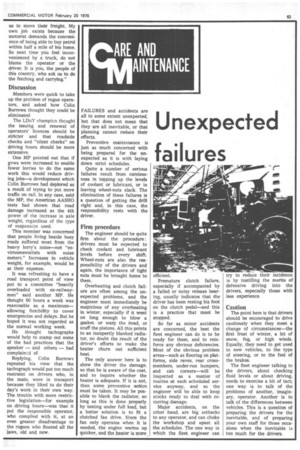Unexpected failures
Page 65

If you've noticed an error in this article please click here to report it so we can fix it.
FAILURES and accidents are all to some extent unexpected, but that does not mean that they are all inevitable, or that planning cannot reduce their effects.
Preventive 'maintenance is just as much concerned with being prepared for the unexpected as it is with laying down strict schedules.
Quite a number of serious failures result from carelessness in topping up the levels of coolant or lubricant, or in leaving wheel-nuts slack. The elimination of these failures is a question of getting the drill right and, in this case, the responsibility rests with the driver.
Firm procedure
The engineer should be quite firm about the procedure : drivers must be expected to check coolant and lubricant levels before every shift. Wheel-nuts are also the responsibility of the drivers and again, the importance of tight nuts must be brought home to them.
Overheating and clutch failure are often among the unexpected problems, and the engineer must immediately be suspicious of any overheating in winter, especially if it went on long enough to blow a gasket. or warp the head, or scuff the pistons. All this points to an inexpertly blanked radiator, no doubt the result of the driver's efforts to make the heater churn out sufficient heat.
The only answer here is to show the driver the damage, so that he is aware of the cost, and to inquire whether the heater is adequate. If it is not, then some ,preventive action must be taken. It may be possible to blank the radiator, so long as this is done properly by testing under full load, but a better solution is to fit a clutched fan drive. Since the fan only operates when it is needed, the engine warms up quicker, and the heater is more efficient.
Premature clutch failure, especially if accompanied by a failed or noisy release bearing, usually indicates that the driver has been resting his foot on the clutch pedal—and this is a practice that must be stopped.
So far as minor accidents are concerned, the best the fleet engineer can do is to be ready for them, and to reinforce any obvious deficiencies. Most of the obvious problem areas—such as flooring on platforms, side raves, rear crossmembers, under-run bumpers, and cab corners—will be inspected as a matter of routine at each scheduled service anyway, and so the engineer will be able to keep stocks ready to deal with recurring darn age.
Major accidents, on the other hand, are big setbacks to any operator, and can choke the workshop and upset all the schedules. The one way in which the fleet engineer can try to reduce their incidence is by 'instilling the merits of defensive driving into the drivers, especially those with less experience.
Caution
The point here is that drivers should be encouraged to drive cautiously when they meet a change of circumstances—the first frost of winter, a bit of snow, fog, or high winds. Equally, they need to get used to new vehicles, to the type of steering, or to the feel of the brakes.
The fleet engineer talking to the drivers, about checking fluid levels or about driving, needs to exercise a bit of tact; one way is to talk of the problems of another, imaginary, operator. Another is to talk of the differences between vehicles. This is a question of preparing the drivers for the inevitable, and of preparing your own staff for those occasions when the inevitable is too much for the drivers.
















































































































